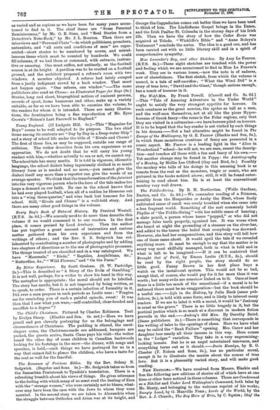The Fiddle - String. By R. H. Bretherton. (Wells Gardner, Darton, and
Co. 2s. 6d.)—We remember reading of a Princess, possibly from the Hesperides or Araby the Blest, whose finely cultivated sense of smell was sorely troubled when she came into a less fragrant world. Something of the sort commonly befell Phyllis of "the Fiddle-String" with her subtle sense of hearing; a slate pencil, a person whose knees "popped," or who did not manage false teeth properly, agonised her. It was worse when she heard at night the grounding of a steamer on the river-bar, and added to the terror the belief that everybody was drowned. However, she had her compensations, and this story will tell how one of these came about. It would spoil the tale if we revealed anything more. It must be enough to say that the matter is in every way most skilfully managed, both in what is told and in what is left to be imagined.—If it can be contrived that Brought Out of Peril, by Emma Leslie (R.T.S., 2s.), should be read by the right people, the story should do no little good. Fanny Brown in her first place buys a watch on the instalment system. This would not be so bad, except that, of course, she would pay for it far more than it was worth ; but many evils are somehow linked on to it. Once at least there is a little too much of the sensational—if a moral is to be enforced there must be no exaggeration—but the book should be a useful one.—Life in the Making, by Julia Hack (same pub-. lishers, 28.), is told with some force, and is likely to interest many readers. If we are to label it with a moral, it would be "Jealousy is cruel as the grave." There is no little tragedy in it, but the poetical justice which is so much at a discount in modern fiction prevails in the end.—Audrey's Old Man. By Dorothy Baird. (Same publishers. 2s.)—There is something that corresponds in the writing of tales to the openings of chess. Here we have what may be called the " Bank Failure " opening. Mrs. Carew and her daughter lose nearly all their income in this way. Here comes in the " Lodger" variation. They take in a very unpromising- looking inmate. But he is an angel entertained unawares, and everything turns out as it should.—Doris Hamlyn, by R. 0. Chester (T. Nelson and Sons, 2s.), has no particular moral, except it be to illustrate the maxim about the course of true love. But it is a pleasantly varied story, and will make good reading.


























































 Previous page
Previous page